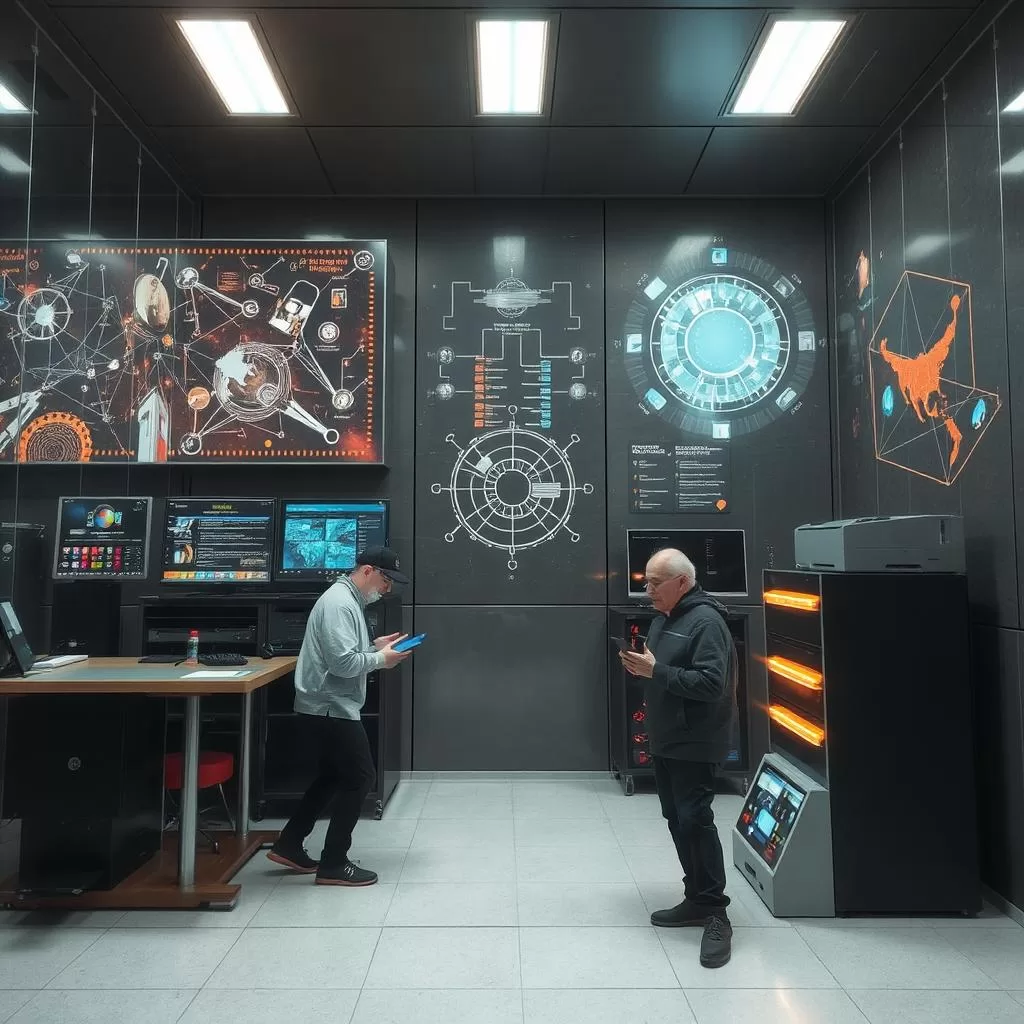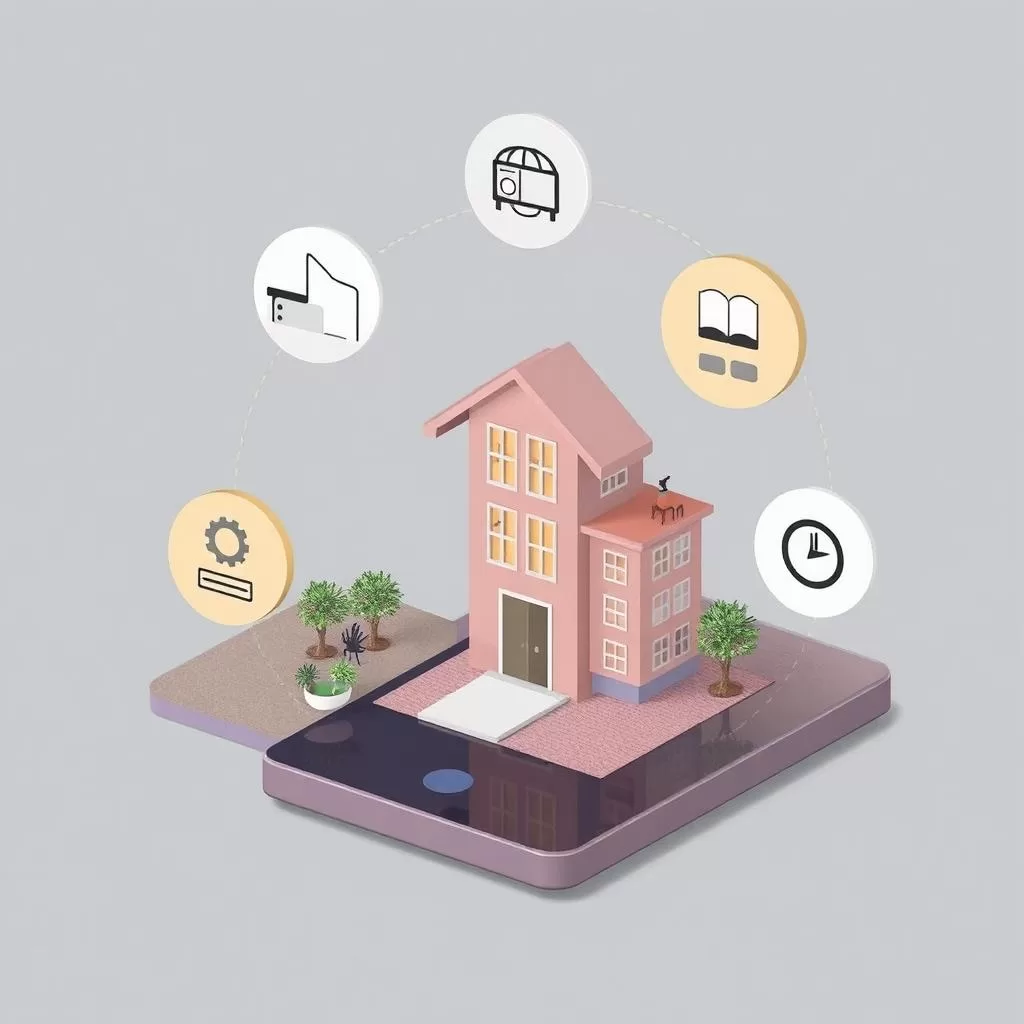Emerging Technologies in 2025: Top 10 That Will Shape the Future
Technology is evolving faster than ever, and 2025 will see groundbreaking innovations that will impact industries ranging from finance and healthcare to AI and space exploration. From quantum computing to 5G expansion, these emerging technologies will redefine how we work, live, and interact with the digital world.
In this article, you’ll discover:
- The 10 most powerful technologies shaping 2025
- How they will impact businesses and daily life
- What industries are set for major disruption
Artificial Intelligence (AI) and Generative AI: A key emerging technology
AI continues to evolve with machine learning, deep learning, and automation. In 2025, AI-powered chatbots, AI-driven customer service, and AI in fintech will become standard.
🔹 AI Trends in 2025:
✔ Generative AI (ChatGPT, DALL-E, Midjourney) will revolutionize content creation by enabling machines to produce high-quality text, images, and videos with minimal human input. As a result, content production will become faster and more personalized. This shift will transform industries like marketing, entertainment, and design, making it easier for businesses to engage with their audiences.
✔ AI-driven medical diagnosis will significantly enhance healthcare by improving the accuracy and speed of early disease detection. By analyzing medical data such as images, genetic information, and patient history, AI models will identify potential health risks. Consequently, doctors will be able to make more informed decisions, and patients will benefit from quicker diagnoses, leading to better treatment outcomes.
✔ AI in fintech will continue to evolve by enhancing fraud detection capabilities. Machine learning algorithms will analyze patterns in financial transactions to identify suspicious activities in real time, helping prevent fraud more effectively. Furthermore, AI will automate financial decision-making, providing consumers with more efficient ways to manage their finances. This, in turn, will make personal finance management more accessible and data-driven.
🔗 Related: The future of Web Development: Trends, Tools and Technologies
5G and 6G Connectivity
The global rollout of 5G networks has already transformed internet speeds, but 6G is on the horizon, promising even faster and more reliable connections.
What 5G & 6G Mean for the Future:
✔ Faster internet speeds will revolutionize industries by enabling real-time cloud gaming and enhanced augmented reality (AR) experiences. With 5G and 6G networks, latency will be minimized, making immersive experiences seamless and responsive. Consequently, gaming, entertainment, and education sectors will witness a transformation, offering users highly interactive and realistic experiences.
✔ Smart cities will leverage the power of 5G and 6G networks to enhance urban infrastructure. Autonomous vehicles will be able to communicate instantly with traffic systems, improving safety and efficiency on the roads. Additionally, Internet of Things (IoT) devices across the city will be better connected, optimizing services such as energy management, healthcare, and waste collection, ultimately leading to more sustainable and efficient urban living.
✔ Businesses will experience significant benefits from the ultra-low latency and high-speed data transfer enabled by 5G and 6G. Cloud computing services will be faster and more reliable, allowing companies to access, process, and share data in real time. As a result, industries will be able to improve operational efficiency, enhance collaboration, and develop innovative solutions more quickly.
Blockchain and Decentralized Finance (DeFi)
Blockchain technology is expanding beyond cryptocurrency, with applications in banking, cybersecurity, and supply chain management.
🔹 How Blockchain Is Transforming Industries:
✔ DeFi platforms are revolutionizing the financial sector by replacing traditional banking services with peer-to-peer finance. Using blockchain technology, decentralized finance (DeFi) allows individuals to borrow, lend, trade, and earn interest without intermediaries like banks. As a result, it is providing greater financial inclusion, lowering transaction costs, and offering more control over personal finances.
✔ Smart contracts on blockchain networks like Ethereum and Solana are automating business transactions, reducing the need for middlemen and ensuring transparency. These self-executing contracts automatically enforce the terms of agreements, streamlining processes such as real estate sales, insurance claims, and supply chain management. Consequently, businesses can operate more efficiently, securely, and with fewer risks of human error.
✔ NFTs (Non-Fungible Tokens) & tokenization are redefining digital ownership, particularly in the entertainment, art, and gaming sectors. By creating verifiable ownership on the blockchain, NFTs allow creators to monetize their work directly, while buyers gain ownership of unique digital assets. Additionally, this technology is disrupting industries like gaming, where players can own, sell, or trade in-game items or assets, unlocking new revenue streams.
Quantum Computing: Another one of Emerging Technology
Quantum computing will revolutionize data processing, solving complex problems a trillion times faster than traditional computers.
Why Quantum Computing Matters as an emerging technology:
✔ Cracking unbreakable encryptions: Quantum computing has the potential to break current encryption methods that are deemed uncrackable by classical computers. While this poses risks to existing security systems, it also opens the door to the development of quantum-resistant encryption techniques, offering a new level of protection for sensitive data.
✔ Accelerating drug discovery: Quantum computers can process vast amounts of data and simulate molecular structures at an unprecedented scale. This ability will significantly speed up drug discovery, allowing scientists to identify potential treatments for diseases more quickly, ultimately leading to faster cures and advancements in healthcare.
✔ Enabling AI models to learn exponentially faster: Quantum computing could greatly enhance artificial intelligence by enabling faster and more efficient computations. This would accelerate machine learning models, allowing AI systems to evolve and learn much faster. As a result, we could see breakthroughs in fields such as robotics and personalized medicine.
💡 Big Players: Google, IBM, and Microsoft are investing billions in quantum R&D.
Extended Reality (AR, VR, and MR)
The future of augmented reality (AR), virtual reality (VR), and mixed reality (MR) is expanding into gaming, education, and remote work.
Applications of Extended Reality in 2025:
✔ AR-powered smart glasses will replace smartphones: Augmented Reality (AR) will significantly change how we interact with technology. By 2025, AR-powered smart glasses will likely replace smartphones. Users will access information, communicate, and navigate the digital world seamlessly, without holding a physical device. These glasses will overlay digital elements onto the real world, making technology even more integrated into our daily lives.
✔ VR-based education & training will become mainstream: Virtual Reality (VR) will revolutionize education and training by providing immersive, hands-on experiences. In 2025, VR will become a standard tool for learning. Students and professionals will engage in simulated environments, offering realistic and interactive experiences. This technology will enhance training in fields like medicine and engineering. It will also improve accessibility to high-quality education, making learning more effective and inclusive.
✔ Metaverse experiences will evolve into fully immersive digital worlds: The Metaverse, a collective virtual shared space, will evolve into fully immersive, interconnected digital worlds by 2025. Users will be able to interact with others, attend events, work, and socialize within these virtual environments. With advancements in AR, VR, and blockchain, the Metaverse will become a central hub for digital economies, entertainment, and social interactions, blurring the lines between the physical and digital worlds.
Internet of Things (IoT) and Smart Cities
IoT-powered smart cities will use sensors, AI, and automation to optimize traffic, energy consumption, and public services.
How IoT Will Change Daily Life as one of the Emerging Technologies:
✔ Self-driving cars communicating via IoT: In the near future, self-driving cars will rely heavily on the Internet of Things (IoT) to communicate with each other and the surrounding infrastructure. This interconnected network will enhance vehicle safety, optimize traffic flow, and enable more efficient autonomous driving, reducing accidents and making transportation smoother and more sustainable.
✔ Smart homes using AI assistants for energy efficiency: The rise of smart homes powered by IoT devices will change how we manage energy consumption. Through AI assistants like Amazon’s Alexa or Google Assistant, smart thermostats, lighting systems, and appliances will automatically adjust settings based on real-time data, ensuring energy is used more efficiently. These emerging technologies will reduce energy costs and contribute to sustainability by cutting down on unnecessary waste.
✔ IoT in healthcare for real-time patient monitoring: IoT devices in healthcare will allow for real-time monitoring of patients’ vitals and conditions, enhancing patient care and early diagnosis. Wearable health trackers and connected medical devices will send continuous data to healthcare providers, enabling them to detect potential issues before they escalate. This shift will not only improve patient outcomes but also allow for more personalized and proactive treatment.
Autonomous Vehicles and Electric Mobility: Emerging Technologies Shaping the Future of Transportation
The automotive industry is shifting towards self-driving and electric vehicles (EVs), led by Tesla, Waymo, and Rivian.
✔ Level 5 fully autonomous cars (no human intervention needed): The future of autonomous vehicles lies in achieving Level 5 autonomy, where cars operate without any human input. These fully autonomous vehicles will be able to navigate complex roadways, handle all driving tasks, and make real-time decisions, marking a significant milestone in emerging technologies. As a result, passengers will no longer need to focus on driving, leading to increased safety and efficiency on the roads.
✔ EV adoption surges due to lower costs and sustainability benefits: As electric vehicles (EVs) become more affordable, their adoption will increase. Advances in emerging technologies, such as improved battery efficiency and renewable energy sources, are driving this shift. EVs will reduce the environmental impact of traditional gasoline-powered cars. Additionally, they offer cost savings on fuel and maintenance, making them more accessible to both consumers and businesses.
✔ AI-powered traffic systems will improve city transportation: AI-powered traffic systems will revolutionize urban transportation by optimizing traffic flow, reducing congestion, and enhancing overall city mobility. Using emerging technologies like IoT sensors and machine learning, these systems will monitor traffic patterns in real-time and adjust signals accordingly, reducing travel time and enhancing safety. In addition, they will support the efficient integration of autonomous vehicles, making city transportation smarter and more sustainable.
Biotech and Genetic Engineering
Advancements in gene editing, synthetic biology, and regenerative medicine will lead to medical breakthroughs.
Biotech Trends in 2025: Emerging Technologies Revolutionizing Healthcare and Agriculture
🔹 CRISPR Gene Editing for Disease Prevention
One of the most groundbreaking emerging technologies in biotech is CRISPR gene editing. This technique allows scientists to precisely alter DNA, potentially eradicating genetic diseases before birth. As CRISPR technology continues to evolve, it will not only treat genetic disorders but could also prevent them from occurring in the first place. Consequently, this could lead to a future where hereditary diseases are significantly reduced or even eliminated.
🔹 Artificial Organs and Lab-Grown Meat Becoming Mainstream
Another exciting development is the commercialization of artificial organs and lab-grown meat. Advancements in tissue engineering could lead to artificial organs replacing damaged ones, solving the donor organ shortage. Similarly, lab-grown meat, produced without traditional animal farming, will revolutionize food production and enhance sustainability.
🔹 AI-Driven Personalized Medicine Through DNA Analysis
In addition, personalized medicine powered by AI-driven DNA analysis will continue to rise. By analyzing a person’s genetic makeup, AI can tailor treatments specifically to an individual’s needs, improving outcomes and reducing side effects. As this technology advances, healthcare will become more individualized, offering more effective and precise care.
Cybersecurity Innovations
With data breaches and cyber threats increasing, AI-powered security systems will be the future of cyber defense.
Emerging Cybersecurity Technologies in 2025:
🔹 AI-Based Threat Detection for Real-Time Cyberattack Prevention
As cybersecurity threats become more sophisticated, emerging technologies like AI-based threat detection are becoming increasingly essential. AI systems are capable of analyzing vast amounts of data in real-time, detecting anomalies, and identifying potential security breaches before they cause harm. By continuously monitoring networks and systems, AI can proactively stop cyberattacks, minimizing damage and reducing the need for manual intervention. As these AI algorithms evolve, their accuracy and speed in recognizing emerging threats will enhance overall digital protection.
🔹 Zero-Trust Security Models Replacing Traditional Authentication
In addition, zero-trust security models are expected to replace traditional authentication methods. Unlike conventional approaches that trust users within a network, zero-trust assumes no user or device is inherently trustworthy. Every access request is verified, ensuring that even trusted users must authenticate their identity multiple times. This shift is crucial as it addresses the growing need for robust, multifactor authentication in an increasingly connected world. By adopting zero-trust models, organizations can reduce the risk of insider threats and data breaches.
🔹 Biometric Security Systems Becoming Mainstream
Furthermore, biometric security methods, such as fingerprint and facial recognition, will become widespread by 2025. These advanced authentication methods provide an additional layer of protection by relying on unique biological traits. As biometric sensors become more accurate and accessible, users will experience more secure, seamless authentication across platforms. From smartphones to financial institutions, biometric data ensures that only authorized individuals can access sensitive information. This greatly reduces the risk of unauthorized access or identity theft.
Emerging Technologies in Space Exploration and Commercial Space Travel: Paving the Way for the Future
The space industry is experiencing a revolution with private companies like SpaceX, Blue Origin, and NASA pushing boundaries.
Mars Colonization Plans by SpaceX and NASA
One of the most exciting frontiers in space tech is the prospect of Mars colonization. SpaceX, led by Elon Musk, aims to make life multiplanetary by sending humans to Mars within the next decade. Emerging technologies, particularly in rocketry and AI, are critical to this ambitious goal. SpaceX’s Starship, designed to carry large crews and cargo to Mars, represents a leap forward in reusable space travel. Similarly, NASA’s Artemis program, in partnership with SpaceX, aims to establish a sustainable human presence on the Moon. This will serve as a stepping stone for future Mars missions. Advances in propulsion systems, life support, and habitat construction are expected to revolutionize long-duration space travel.
Space Tourism: The New Frontier with Companies Like Blue Origin & Virgin Galactic
In addition to interplanetary exploration, space tourism is rapidly becoming a reality. Companies like Blue Origin and Virgin Galactic are leading the charge in offering commercial spaceflights to civilians. Blue Origin’s New Shepard rocket offers suborbital flights, giving passengers a brief weightlessness experience and stunning views of Earth from space. Meanwhile, Virgin Galactic’s SpaceShipTwo aims for higher altitudes, crossing the space boundary and providing a unique journey for tourists. Thanks to emerging technologies in rocketry, safety systems, and passenger experience design, space tourism is evolving into an accessible industry.
AI-Powered Space Exploration for Deep Space Missions
Another groundbreaking development in space technology is the application of AI in space exploration. AI is playing a crucial role in making deep-space missions more efficient and autonomous. For instance, NASA’s Perseverance rover, currently on Mars, uses AI to analyze its surroundings and make decisions without waiting for instructions from Earth. This autonomous decision-making is crucial for missions that can take months or even years to complete. Moreover, AI algorithms analyze vast data from distant planets and moons. This helps scientists identify landing sites, detect signs of life, and optimize mission strategies. As AI advances, future missions will rely more on it. It will navigate uncharted territories, making space exploration more efficient and less reliant on human oversight.
Conclusion: The Future Is Here
🚀 2025 and beyond will be a year of massive technological disruption, with advancements in AI, blockchain, biotech, and space exploration reshaping industries.
💬 Which of these technologies excites you the most? Share your thoughts in the comments!
Share this content:







Post Comment